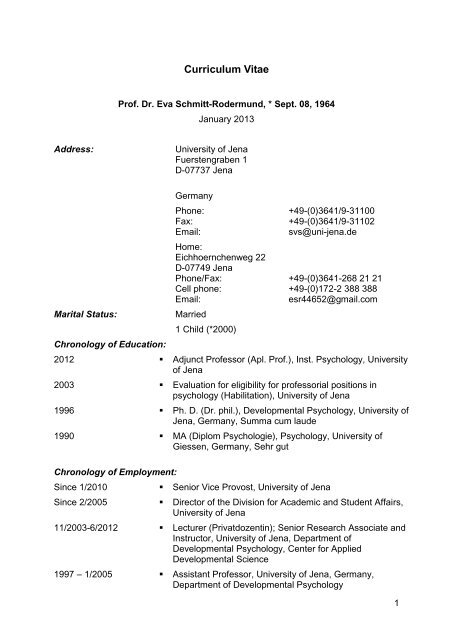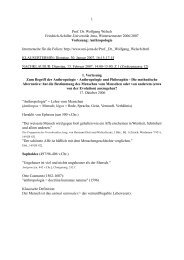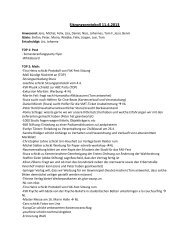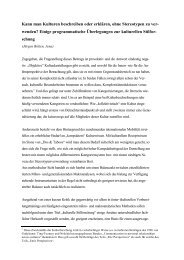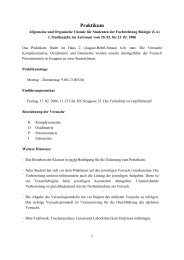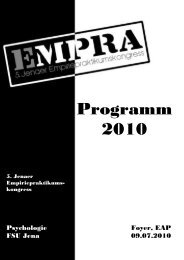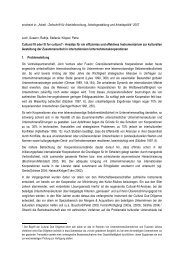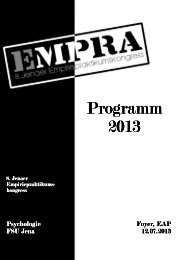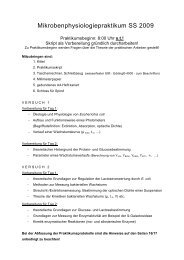Curriculum Vitae
Curriculum Vitae
Curriculum Vitae
You also want an ePaper? Increase the reach of your titles
YUMPU automatically turns print PDFs into web optimized ePapers that Google loves.
<strong>Curriculum</strong> <strong>Vitae</strong>Prof. Dr. Eva Schmitt-Rodermund, * Sept. 08, 1964January 2013Address:University of JenaFuerstengraben 1D-07737 JenaMarital Status:Chronology of Education:2012200319961990Chronology of Employment:Since 1/2010Since 2/200511/2003-6/20121997 – 1/2005GermanyPhone:Fax:Email:Home:Eichhoernchenweg 22D-07749 JenaPhone/Fax:Cell phone:Email:Married1 Child (*2000)+49-(0)3641/9-31100+49-(0)3641/9-31102svs@uni-jena.de+49-(0)3641-268 21 21+49-(0)172-2 388 388esr44652@gmail.com• Adjunct Professor (Apl. Prof.), Inst. Psychology, Universityof Jena• Evaluation for eligibility for professorial positions inpsychology (Habilitation), University of Jena• Ph. D. (Dr. phil.), Developmental Psychology, University ofJena, Germany, Summa cum laude• MA (Diplom Psychologie), Psychology, University ofGiessen, Germany, Sehr gut• Senior Vice Provost, University of Jena• Director of the Division for Academic and Student Affairs,University of Jena• Lecturer (Privatdozentin); Senior Research Associate andInstructor, University of Jena, Department ofDevelopmental Psychology, Center for AppliedDevelopmental Science• Assistant Professor, University of Jena, Germany,Department of Developmental Psychology1
2002200119971994-19971990-1994• Visiting Professor, College for Health and Family Studies,The Pennsylvania State University, USA• Maternity leave• Visiting Scholar, Methodology Center, College for Healthand Family Studies, The Pennsylvania State University,USA• Senior Research Associate and Instructor, University ofJena, Germany, Department of DevelopmentalPsychologyResearch Associate and Instructor, University of Giessen,Germany, Department of Developmental PsychologyMajor Areas ofResearch:• Career development throughout the life span, earlydevelopment of entrepreneurial motivation and behavior,personality and family background of adult successfulentrepreneurs, precursors of entrepreneurial behavior inadolescents and young adults• Acculturation of adolescent immigrants, problem behaviorfollowing immigration, adolescent time tables fordevelopment, school adjustment• Play behaviour, toy security, and attachment in toddlersand pre-schoolers• Puberty, timing of pubertal changes• Problem behavior in childhood and adolescence• Training and intervention programs, evaluationmethodologyHonors and Awards:20052005200420021999-20031997• Körber Stiftung Award “Studienpreis Mythos Markt” withthe program Who is an entrepreneur?, Dr. Elke Schröder• Secundo loco for a professorship in the program „Studiesof Excellence“, LMU München• Secundo loco for the chair “Developmental Psychology”,University of Tartu, Estonia• Primo loco for a professorship at the “Jacobs Center ofLife Long Learning”, Jacobs University, Bremen, Offer notaccepted• Career Development Award, German Research Council(Schm 1124/4-1)• Best Dissertation of the Year Award (College forBehavioral and Social Sciences), University of Jena• Summer School Fellowship, International Society for the2
1994 Study of Behavioral Development, EstoniaResearch Grants:2011-20142010, 2006-20082006-20102001-20052002-20042000-2003Third party funding (PI only) from 1998 to presentamounts to approximately 2,2 Mio. Euros• Female Business Founders – why so few? (FederalMinistry of Economics and Technology; EuropeanStructural Funds; EXIST – Science based Business Startups; 03EGH1TH02. Part of a network project headed byKurt-Dieter Koschmieder & Kerstin Rötzler. PI EvaSchmitt-Rodermund)• Success and failure of innovative company start-ups:Developmental pathways of entrepreneurs (ThuringianMinistry of Education; Part of a network project headed byUwe Cantner, Rainer K. Silbereisen, Gabriele Beibst. PIs:Eva Schmitt-Rodermund, Elke Schröder)• Entrepreneurial interest in offspring of family businessowners (Federal Ministry of Economics and Technology;Part of a network project headed by Kurt-DieterKoschmieder, Claudia Eggert & Kerstin Rötzler, ElkeSchröder & Eva Schmitt-Rodermund, Matthias Maier. PIs:Elke Schröder, Eva Schmitt-Rodermund)• The impact of social and cultural adaptation of juvenileimmigrants from the former Soviet Union in Israel andGermany on delinquency and deviant behavior [German-Israeli Project Cooperation DIP (Federal Ministry ofEducation and Research)] (DIP – C.4.1.; Rainer K.Silbereisen, Eva Schmitt-Rodermund, Univ. Jena, andGideon Fishman, Zvi Eisikovits, Gustavo Mesch, Univ.Haifa)• Enhancement of entrepreneurial motivation among EastGerman adolescents and young adults – implementationof an intervention program [Federal Ministry ofTechnology, Research and Science, Thuringian Ministryfor Science, Research, and Culture; Program for theenhancement of self-employment EXIST](03EX012C/B607-99008)• “Conflict and cooperation between groups. Perspectivesfrom social and developmental psychology” InternationalCenter of Excellence for Graduate Studies at theUniversity of Jena (Rainer K, Silbereisen, AmélieMummendey, Peter Noack, Eva Schmitt-Rodermund andSabine Otten), University of Kent at Canterbury, UK(Dominic Abrams, Rupert Brown), Catholic University ofLouvain at Louvain-La-Neuve, Begium (Jacques PhilippeLeyens, Vincent Yzerbyt). Grant by German Research3
2003200220001999-200119981996-1998Council.• Categorisation and fine motoric development. Anobservational study (PIs Eva Schmitt-Rodermund andRainer K. Silbereisen, third party contract research)• Toy related interaction behavior of mothers and their 3 to 6year olds. An observational study. (PIs Rainer K.Silbereisen and Eva Schmitt-Rodermund, third partycontract research).• Team spirit, leadership, creativity – Games and materialsfor a training program [Early Career Grant, University ofJena] (ATG71)• Enhancement of entrepreneurial motivation among EastGerman adolescents and young adults – development andevaluation of an intervention program [Federal Ministry ofTechnology, Research and Science, Thuringian Ministryfor Science, Research, and Culture; Program for theenhancement of self-employment EXIST](03EX012C/B607-99008)• Early precursors of entrepreneurship – A study amongJena students, [Early Career Grant, University of Jena](ATG71)• Who is an entrepreneur? Systems of behavior andmotivation in self-employed adults [Thuringian Ministry ofScience, Research, and Culture] (Co-principal investigatorRainer K. Silbereisen, B211-96019)Teaching Experience:1990-present• Introduction to Developmental Psychology I and II(Lecture, B.Sc., B.A. Minor in Psychology)• Adolescence• The family as developmental context• Research in developmental psychology I and II (Englishlanguage course)• Prenatal development and infancy• Sex differences and gender roles• Early social relationships in childhood• Prevention of alcohol- and drug use in adolescence• Career development and work• Between kindergarten and puberty: Childhood• Attachment – A life span concept• Cross-cultural psychology and acculturation• Methods of developmental psychology• Work as context and outcome of development4
• Social cognition• Development in context: Historical and cultural conditions• Outreach of Academia: Development and Evaluation of aprogram for the prevention of alcohol and tobacco use(Research Experience Course)• Does being a B-kid also mean more developmentalprogress? Attachment and development. An observationalstudy among 16 toddlers and their mothers (ResearchExperience Course)• Who will be an entrepreneur? The development ofentrepreneurial interests among 16-year old adolescents.A survey study (Research Experience Course)• Correlates of entrepreneurship among University students.Designing, using and evaluating a questionnaire(Research Experience Course)• Secondary data analyses: Finding and using a 50 yearlongitudinal study (Research Experience Course)Other ProfessionalActivities:2007-20102004/05, 2005/06,2006/072000, 20021999-20001998-20001997-20001997-20001996-19991990-19941990-present• Elected deputy member of the University Senate,University of Jena• Juror for The German Study Award (Risk; Myth Market;Life and Work), Körber Stiftung• Program committee member for the 2000 and 2002Meetings of the German Psychological Association• Elected member of the University Senate• Member of the Organizing Committee for the 7th BiennialMeeting of the European Association for Research onAdolescence, May 31 – June 4, 2000, (www.eara2000.unijena.de)• Elected Member of the University Council, University ofJena• Elected Member of the Steering Committee of the Collegefor Behavioral and Social Sciences, University of Jena• Elected Member of the Steering Committee of the Instituteof Psychology, University of Jena• Project management for “Ethnic Germans re-migrating intoGermany – process and results of acculturation”• Advisor for MA and Ph.D. theses (with currently 1dissertation in progress)5
Ad hoc Reviewer:1996 –present• Contemporary Psychology Journal• European Journal of Psychology and Education• European Journal of Developmental Psychology• Deutsche Forschungsgemeinschaft (German ResearchCouncil)• Developmental Psychology• German Israeli Foundation for Scientific Research andDevelopment• International Journal of Behavioral Development• International Journal of Group Tensions• International Journal of Psychology• Jahrbuch der Medizinischen Psychologie• Johann Jacobs Foundation• John-Templeton Foundation• Journal of Adolescent Research• Journal of Applied Social Psychology• Journal of Reseach on Adolescence• Journal of Youth and Adolescence• Kölner Zeitschrift für Soziologie und Sozialpsychologie• Learning and Instruction• Psychologie in Erziehung und Unterricht• World Psychology6
PublicationsChristmas-Best, V. E. & Schmitt-Rodermund, E. (2001). Adolescents’ career choicesin East and West Germany after unification: Interregional and intraregionaldifferences and the role of gender. American Behavioral Scientist, 44, 1879-1898.Hüttner, C. & Schmitt-Rodermund, E. (2010). Jena – ausgerechnet… Eine Studie zuden Motiven der Studienortwahl westdeutscher Studierender an derUniversität Jena. Jena: FSU.Kracke, B. & Schmitt-Rodermund, E. (2001). Adolescents’ career exploration in thecontext of educational and occupational transitions. In J. E. Nurmi (Ed.),Navigating through adolescence: European perspectives (pp. 141-165). NewYork: Routledge.Obschonka, M. Schmitt-Rodermund, E., Silbereisen, R. K., Gosling, S. D. & Potter, J.(in press). The regional distribution and correlates of an entrepreneurshippronepersonality profile in the U.S., Germany, and the UK: A socioecologicalperspective. Journal of Personality and Social Psychology.Obschonka, M., Silbereisen, R. K., & Schmitt-Rodermund, E. (2010). Entrepreneurialintention as developmental outcome. Journal of Vocational Behavior, 77, 63-72.Obschonka, M., Silbereisen, R. K., & Schmitt-Rodermund, E. (in press) Explainingentrepreneurial behavior: Dispositional personality traits, growth of personalentrepreneurial resources, and business idea generation. The CareerDevelopment Quarterly.Obschonka, M., Silbereisen, R. K., & Schmitt-Rodermund, E. (in press).Entrepreneurial Success as developmental outcome: A path model from a lifespan perspective of human development. European Psychologist.Obschonka, M., Silbereisen, R. K., Schmitt-Rodermund, E. & Stuetzer, M. (2011).Nascent entrepreneurship and the developing individual: Early entrepreneurialcompetence in adolescence and venture creation success during the career.Journal of Vocational Behavior, 79, 121-133.Schmitt-Rodermund, E. (1997). Akkulturation und Entwicklung. Eine Studie unterjungen Aussiedlern. Weinheim: Beltz-Psychologie Verlags Union.Schmitt-Rodermund, E. (1997). Parent’s jobs and children’s life. Book review.International Journal of Behavioral Development, 21, 636-638.Schmitt-Rodermund, E. (1999). Zur Geschichte der Deutschen in den Ländern desehemaligen Ostblocks. In R.K. Silbereisen, E. D. Lantermann & E. Schmitt-Rodermund (Ed.), Aussiedler in Deutschland. Akkulturation von Persönlichkeitund Verhalten (pp. 49-66). Opladen: Leske und Budrich.Schmitt-Rodermund, E. (1999). Entwicklungsorientierte Prävention am Beispiel desDrogengebrauchs im Jugendalter. [Development-oriented prevention: Theexample of drug use in adolescence]. In R. Oerter, C. von Hagen, G. Roeper& G. Noam (Ed.), Klinische Entwicklungspsychologie (pp. 421-436).Weinheim: Beltz Psychologie Verlags Union.7
Schmitt-Rodermund, E. (2000). Adolescents’ worlds: Culture makes the difference.The adolescent experience. Book review. Contemporary Psychology, 45, 168-170.Schmitt-Rodermund, E. (2000). Unternehmer werden ist schon schwer – es zu seinist es noch mehr... Unternehmerischer Erfolg wie er im Buche steht.[Entrepreneurial success and how to get there. Book review].Buchbesprechung. Zeitschrift für Arbeits- und Organisationspsychologie, 44,161-162.Schmitt-Rodermund, E. (2004). Gibt es gravierende psychosoziale Probleme bei derIntegration von jugendlichen Aussiedlern? [Are there serious psychosocialproblems in the integration of young ethnic German immigrants?] In DBHBildungswerk (Ed.), Spätaussiedler – Interkulturelle Kompetenz für dieStraffälligenhilfe und den Justizvollzugsdienst (pp. 71-86). Mönchengladbach:Forum Verlag Godesberg.Schmitt-Rodermund, E. (2004). Pathways to successful entrepreneurship: Parenting,personality, competence, and interests. Journal of Vocational Behavior, 65,498-518.Schmitt-Rodermund, E. (2005). Wer wird Unternehmer? Persönlichkeit,Erziehungsstil, sowie frühe Interessen und Fähigkeiten als Vorläufer fürunternehmerische Aktivität im Erwachsenenalter [Enterprising over the lifespan. Personality, parenting, early interests and competencies as precursorsfor entrepreneurial activity in adulthood]. Wirtschaftspsychologie, II. 7. Jg., 7-23.Schmitt-Rodermund, E. (2006). Human capital. In J. H. Greenhaus (Ed.),Encyclopedia of career development. Thousand Oaks: Sage.Schmitt-Rodermund E. (2007). The long way to entrepreneurship. Personality,parenting, early interests and competencies for entrepreneurial activity amongthe “Termites”. R. K. Silbereisen & R. M. Lerner (Eds.), Approaches to positiveyouth development, 205-224. Thousand Oaks: Sage.Schmitt-Rodermund, E. (2008). Immigration. In R. M. Silbereisen & M. Hasselhorn(Eds.), Enzyklopädie der Psychologie. Serie V (Entwicklung), Band 5:Psychologie des Jugendalters (pp. 777-806). Göttingen: Hogrefe.Schmitt-Rodermund, E. (2011). Die Guten ins Töpfchen, die Schlechten insKröpfchen? Nachfragen zur Qualitätssicherung durch Studierendenauswahl.K. Dicke (Ed.), Qualitätssicherung und Qualitätsförderung in der Universität,Lichtgedanken. Jenaer Universitätsschriften, Band 1 (pp. 96-104). Weimar:Weimarer Verlagsgesellschaft.Schmitt-Rodermund, E. & Christmas-Best, V. E. (1999). Kranführer oderKrankenschwester – berufliche Vorstellungen Jugendlicher aus Ost und West.[Crane operator or nurse? Vocational plans of adolescents from East andWest Germany]. In R. K. Silbereisen & J. Zinnecker (Ed.), Entwicklung imsozialen Wandel (pp. 169-186). Weinheim: Psychologie Verlags Union.Schmitt-Rodermund, E. & Ittel, A. (1999). Noch Kind oder schon Frau - was machtden Zeitpunkt aus? Voraussetzungen für Unterschiede im Entwicklungstempobei Mädchen. [Still a child or already a woman – what makes the difference intiming? Antecedents of differences in pubertal timing in girls]. In R. K.8
Silbereisen & J. Zinnecker (Ed.), Entwicklung im sozialen Wandel (pp. 203-219). Weinheim: Psychologie Verlags Union.Schmitt-Rodermund, E. & Riemenschneider, U. (1996). KörperlichesEntwicklungstempo und jugendtypische Übergänge. [Pubertal timing andyouthful transitions]. In Silbereisen, R. K., Zinnecker, J. & Vaskowics, L. A.(Ed.), Jungsein in Deutschland. Jugendliche und junge Erwachsene 1991 und1996 (pp. 229-245). Opladen: Leske & Budrich.Schmitt-Rodermund, E. & Roebers, C. M. (1999). Akkulturation oder Entwicklung?Veränderungen von Autonomieerwartungen bei Einheimischen und Kindernaus Aussiedlerfamilien. [Acculturation or development? Changes in autonomyexpectations in native German adolescents and young immigrants toGermany]. Psychologie in Erziehung und Unterricht, 46, 161-176.Schmitt-Rodermund, E. & Schröder, E. (2004). Wer hat das Zeug zum Unternehmer?Ein Training zur Förderung unternehmerischer Potenziale. [Who can be anentrepreneur? A training program to foster entrepreneurial potentials].Göttingen: Hogrefe.Schmitt-Rodermund, E. & Schröder, E. (in preparation). The prediction of selfemploymentover 40 years among the Terman women.Schmitt-Rodermund, E. & Silbereisen, R. K. (1995). Im Spannungsfeld zwischendeutsch und fremd: Aussiedlerjugendliche. [In the crossfire between beingGerman and being a foreigner: Adolescent ethnic German immigrants].Zeitschrift für Sozialwissenschaften und Berufspraxis, 18, 114-130.Schmitt-Rodermund, E. & Silbereisen, R. K. (1996). Akkulturation undJugendentwicklung in Aussiedlerfamilien. [Acculturation and adolescentdevelopment in ethnic German immigrant families]. In A. Thomas (Ed.),Psychologie interkulturellen Handelns. (pp. 431-452), Göttingen: Hogrefe.Schmitt-Rodermund, E. & Silbereisen, R. K. (1996). "...meine erste Freundin? Ichglaub' die habe ich so mit 20." Entwicklungsorientierungen jugendlicherAussiedler. [“…My first girlfriend? I think I’ll have one after my 20th birthday“Developmental timetables of ethnic German immigrants to Germany]. In I.Graudenz & R. Roemhild (Eds.), Forschungsfeld Aussiedler. Ansichten ausDeutschland (pp. 85-95). Frankfurt: Peter Lang.Schmitt-Rodermund, E. & Silbereisen, R. K. (1997). Wer hat das Zeug zumUnternehmer – Haben Sie’s? [Who can be an entrepreneur? Can you?]. MAZ-Business Review, 3, 116-121.Schmitt-Rodermund, E. & Silbereisen, R. K. (1998). Career maturity determinants:Individual development, historical time, and situational context. The CareerDevelopment Quarterly, 47, 16-31.Schmitt-Rodermund, E. & Silbereisen, R. K. (1999). Gute Miene zum bösen Spiel:Resilienz unter arbeitslosen Aussiedlern. [Resilience among unemployedimmigrants]. In R.K. Silbereisen, E. D. Lantermann & E. Schmitt-Rodermund(Eds.), Aussiedler in Deutschland. Akkulturation von Persoenlichkeit undVerhalten (pp. 277-300). Opladen: Leske und Budrich.Schmitt-Rodermund, E. & Silbereisen, R. K. (1999). Differentielle Akkulturation vonEntwicklungsorientierungen unter jugendlichen Aussiedlern. [Differentialacculturation of developmental timetables among adolescent ethnic German9
immigrants]. In R.K. Silbereisen, E. D. Lantermann & E. Schmitt-Rodermund(Eds.), Aussiedler in Deutschland. Akkulturation von Persoenlichkeit undVerhalten (pp. 185-202). Opladen: Leske und Budrich.Schmitt-Rodermund, E. & Silbereisen, R. K. (1999). Erfolg von Unternehmern: DieRolle von Persönlichkeit und familiärer Sozialisation. [Entrepreneurial success:The role of personality and family background]. In K. Moser, B. Batinic & J.Zempel (Eds.), Unternehmerisch erfolgreiches Handeln (pp. 115-143).Göttingen: Verlag fuer angewandte Psychologie.Schmitt-Rodermund, E. & Silbereisen, R. K. (1999). Determinants of differentialacculturation of developmental timetables among adolescent immigrants toGermany. International Journal of Psychology, 34, 219-233.Schmitt-Rodermund, E. & Silbereisen, R. K. (2000). Trends im Problemverhaltenjugendlicher Aussiedler während der Akkulturation – Kohortendifferenzen oderintraindividualle Entwicklung? [Trends in psychosocial problem behaviorduring acculturation – Cohort differences or intraindividual developments?].Epd-Dokumentation, 41, 26-39.Schmitt-Rodermund, E. & Silbereisen, R. K. (2000). Jugendliche Aussiedler inDeutschland. Informationen zur politischen Bildung, 267, 47.Schmitt-Rodermund, E. & Silbereisen, R. K. (2002). Psychosoziale Probleme beijungen Aussiedlern – Eine Längsschnittstudie. [Psychosocial problems amongethnic German immigrant youth – A longitudinal study]. Zeitschrift fürEntwicklungspsychologie und Pädagogische Psychologie, 34, 63-71.Schmitt-Rodermund, E. & Silbereisen, R. K. (2002). Akkulturation und Entwicklung:Jugendliche Immigranten [Acculturation and development – adolescentimmigrants]. In R. Oerter & L. Montada (Eds.) Entwicklungspsychologie (pp.893-906). Weinheim: Psychologie Verlags Union.Schmitt-Rodermund, E. & Silbereisen, R. K. (2004). „Ich war gezwungen, alles mitder Faust zu regeln“ – Delinquenz unter jugendlichen Aussiedlern aus derPerspektive der Entwicklungspsychologie. [“I felt that I had to sort it all out withmy fists” – Delinquency among adolescent ethnic German immigrants seenfrom the perspective of developmental psychology] In D. Oberwittler und S.Karstedt (Hrsg.), Soziologie der Kriminalität, Sonderheft der Kölner Zeitschriftfür Soziologie und Sozialpsychologie, 43/2003, 240-263.Schmitt-Rodermund, E. & Silbereisen, R. K. (2007). Psychosoziale Akkulturationjugendlicher Einwanderer nach Deutschland [Psychosocial acculturation ofadolescent immigrants to Germany]. In G. Trommsdorff & H.-J. Kornadt (Eds.),Enzyklopädie der kulturvergleichenden Psychologie (S. 49-85). Göttingen:Hogrefe.Schmitt-Rodermund, E. & Silbereisen, R. K. (2008). Well-adapted adolescent ethnicGerman immigrants in spite of adversity – The protective effects of human,social, and financial capital. European Journal of Developmental Psychology,5, 186-209.Schmitt-Rodermund, E. & Silbereisen, R. K. (2008). Akkulturation und Entwicklung:Jugendliche Immigranten [Acculturation and development – adolescentimmigrants]. In R. Oerter & L. Montada (Eds.) Entwicklungspsychologie (NewEdition). Weinheim: Psychologie Verlags Union.10
Schmitt-Rodermund, E. & Silbereisen, R. K. (2008). The prediction of delinquencyamong immigrant and non-immigrant youth: Unwrapping the package ofculture. International Journal of Contemporary Sociology, 49, 87-109.Schmitt-Rodermund, E. & Silbereisen, R. K. (2009). Immigrant parents’ ageexpectations for the development of their adolescent offspring: Transmissioneffects and changes after immigration. In U. Schönpflug (Ed.), Culturaltransmission. Psychological, developmental, social and methodologicalaspects, (pp. 297-316). Cambridge: Cambridge University Press.Schmitt-Rodermund, E., Silbereisen, R. K. & Wiesner, M. (1996). Junge Aussiedler inDeutschland: Prädiktoren emotionaler Befindlichkeit. [Young ethnic Germansimmigrating to Germany: Predictors of emotional well-being]. Zeitschrift fuerEntwicklungspsychologie und Pädagogische Psychologie, 28, 357-379.Schmitt-Rodermund, E. & Vondracek, F. W. (1999). Breadth of interests, exploration,and identity development in adolescence. Journal of Vocational Behavior, 55,298-317.Schmitt-Rodermund, E. & Vondracek, F. W. (2002). Occupational dreams, choices,and aspirations: Adolescents’ Entrepreneurial Prospects and Orientations.Journal of Adolescence, 25, 65-78.Schmitt-Rodermund, E. & Vondracek, F. W. (in press). Career development. In C. B.Fisher & R. M. Lerner (Eds.), Applied developmental science: Anencyclopaedia of research, policies, and programs. Thousand Oaks: Sage.Schröder, E., Arnaud, N. & Schmitt-Rodermund, E. (2009). Innerfamiliäre Nachfolgein Unternehmen – Studie zur Förderung und Entwicklung des Nachwuchses inFamilienunternehmen (Ergebnisbericht). Jena: Universität Jena, Institut fürPsychologie, Entwicklungspsychologie.Schröder, E. & Schmitt-Rodermund, E. (2005). Trainingsprogramm zur frühzeitigenSensibilisierung für die unternehmerische Selbstständigkeit.Wirtschaftspsychologie aktuell, 4, 46-49.Schröder, E. & Schmitt-Rodermund, E. (2006). UnternehmerischeSchlüsselkompetenzen im Unterricht: Entwicklung und Evaluation eines neuenTrainingsprogramms. Wirtschaft und Erziehung, 58, 155-159.Schröder, E. & Schmitt-Rodermund, E. (2006). Crystallizing enterprising interestsamong adolescents through a career development program: The role ofpersonality and family background. Journal of Vocational Behavior, 69, 494-509.Schröder, E. & Schmitt-Rodermund, E. (2006). Frühzeitige Sensibilisierung für dieunternehmerische Selbstständigkeit durch ein Trainingsprogramm. In H.Haase & A. Lautenschläger (Hrsg.), Die GET UP Initiative: Best Practice-Ansätze der Gründerforschung an Thüringer Hochschulen (S. 39-68). Lohmar:Eul-Verlag.Schröder, E. & Schmitt-Rodermund, E. (2007). Development of entrepreneurialinterests, attitudes, and behaviors. In V. Skorikov & W. Patton (Eds.), CareerDevelopment in Childhood and Adolescence, pp. 127-142. Rotterdam: SensePublishers.11
Schröder, E., Schmitt-Rodermund, E. & Arnaud, N. (2011). Career choice intentionsof adolescents with a family business background. Family Business Review,24, 305-321.Silbereisen, R. K., Lantermann, E. D. & Schmitt-Rodermund, E. (Eds.) (1999).Aussiedler in Deutschland: Akkulturation von Persönlichkeit und Verhalten.[Ethnic German immigrants in Germany: The acculturation of personality andbehavior]. Opladen: Leske und Budrich.Silbereisen, R. K., Lantermann, E. D. & Schmitt-Rodermund, E. (1999). Akkulturationvon Aussiedlern: Viel gelernt – noch mehr zu tun. [Acculturation of immigrants– much learned, more to do]. In R.K. Silbereisen, E. D. Lantermann & E.Schmitt-Rodermund (Eds.), Aussiedler in Deutschland. Akkulturation vonPersönlichkeit und Verhalten (pp. 367-382). Opladen: Leske und Budrich.Silbereisen, R. K. & Schmitt-Rodermund, E. (1993). Entwicklungsorientierungenjugendlicher Aussiedler. Unterschiede je nach Aufenthaltsdauer undAkkulturationserfahrungen. [Developmental timetables of young ethnicGerman immigrants: Differences by length of residence and accuturativeexperience]. Zeitschrift fuer Sozialisationsforschung und Erziehungssoziologie,13, 341-364.Silbereisen, R. K. & Schmitt-Rodermund, E. (1995). Akkulturation vonEntwicklungsorientierungen jugendlicher Aussiedler: Bedeutung von Familieund Peers. [Acculturation of developmental timetables among adolescentimmigrants: The importance of family and peers]. In G. Trommsdorff (Ed.),Kindheit und Jugend im Kulturvergleich (pp. 263-291). Weinheim: Juventa.Silbereisen, R. K. & Schmitt-Rodermund, E. (1995). German immigrants in Germany:Adaption of adolescents' timetables for autonomy. In M. Hofer, P. Noack & J.Youniss (Eds.), Psychological responses to social change: Humandevelopment in changing environments (pp. 105-125). Berlin: De Gruyter.Silbereisen, R. K. & Schmitt-Rodermund, E. (1996). „Entwicklungsfahrpläne“ -Jugendliche in Deutschland unterscheiden sich im Tempo desErwachsenwerdens. [Developmental timetables – Adolescents in Germanydiffer in the pace of growing up]. In P. Dillig & H. Schilling (Eds.),Erziehungsberatung in der Postmoderne (pp. 71-83). Mainz: Matthias-Gruenewald Verlag.Silbereisen, R. K. & Schmitt-Rodermund, E. (1998). Entwicklung im Jugendalter:Prozesse, Kontexte und Ergebnisse. [Adolescent development: Processes,contexts, and results]. In H. Keller (Ed.), Entwicklungspsychologie (pp. 377-398). Bern: Hans Huber.Silbereisen, R. K. & Schmitt-Rodermund, E. (1999). Prognostische Bedeutung vonUnterschieden im Entwicklungstempo während der Pubertät. [Predictiverelevance of differences in pubertal timing]. In R. Oerter, C. von Hagen, G.Roeper & G. Noam (Eds.), Klinische Entwicklungspsychologie (pp. 218-239).Weinheim: Beltz Psychologie Verlags Union.Silbereisen, R. K. & Schmitt-Rodermund, E. (1999). Wohlbefinden der jugendlichenAussiedler. [Well-being of immigrants to Germany]. In R.K. Silbereisen, E. D.Lantermann & E. Schmitt-Rodermund (Eds.), Aussiedler in Deutschland.Akkulturation von Persönlichkeit und Verhalten (pp. 257-276). Opladen: Leskeund Budrich.12
Silbereisen, R. K., Schmitt-Rodermund, E. & Lantermann, E. D. (1999). Hintergrund,theoretische Perspektiven, Anlage und Themen der Aussiedlerstudie.[Background, theoretical perspectives, design and topics of the study]. In R.K.Silbereisen, E. D. Lantermann & E. Schmitt-Rodermund (Eds.), Aussiedler inDeutschland. Akkulturation von Persoenlichkeit und Verhalten (pp. 13-46).Opladen: Leske und Budrich.Silbereisen, R. K. & Schmitt-Rodermund, E. (2000). Adolescent immigrants‘ wellbeing:The case of ethnic German immigrants in Germany. InternationalJournal of Group Tensions, 29, 79-100.Strohmeier, D. & Schmitt-Rodermund, E. (2008). Immigrant youth in Europeancountries: The manifold challenges of adaptation. Special Issue. EuropeanJournal of Developmental Psychology, 5, 129-137.Stützer, M., Obschonka, M. & Schmitt-Rodermund, E. (in press). Balanced skillsamong nascent entrepreneurs. Small Business Economics: AnEntrepreneurship Journal.Titzmann, P. F., Schmitt-Rodermund, E. & Silbereisen, R. K: (2005). Zwischen denKulturen: Zur Akkulturation jugendlicher Immigranten. [Between cultures:About the acculturation of adolescent immigrants]. In U. Fuhrer & H. H.Uslucan (Eds.), Familie, Akkulturation und Erziehung (pp. 86-110). Stuttgart:Kohlhammer.Titzmann, P. F. & Schmitt-Rodermund, E. (2005). Acculturation. In L. R. Sherrod, C.Flanagan, R. Kassimir & A. Syvertsen (Eds.), Youth Activism: An InternationalEncyclopedia (pp. 31-34). Westport, CT: Greenwood Publishing Company.Titzmann, P. F., Silbereisen, R. K. & Schmitt-Rodermund, E. (2007). Friendshiphomophily among diaspora migrant adolescents in Germany and Israel.European Psychologist, 12, 181-195.Titzmann, P. F., Silbereisen, R. K., Mesch, G., & Schmitt-Rodermund, E. (2011).Migration-specific hassles among adolescent immigrants from the formerSoviet Union in Germany and Israel. Journal of Cross Cultural Psychology, 42,777-794.Weichold, K., Silbereisen, R. K. & Schmitt-Rodermund, E (2003). Short-term andlong-term consequences of early versus late physical maturation inadolescents. In C. Hayward (Ed.) Gender differences at puberty (pp. 241-276).Cambridge: Cambridge University Press.Weichold, K., Silbereisen, R. K., Schmitt-Rodermund, E., Vorwerk, L. & Miltner, W.(in press). Links between timing of puberty and behavioral indicators ofindividuation. Journal of Youth and Adolescence.13
Scholarly PresentationsHelbig, M.K. & Schmitt-Rodermund, E. (2004). Ethnische Identifikation jugendlicherAussiedler [Ethnic Identification of adolescent Ethnic Germans]. Posterpresented at the 44. Kongress der deutschen Gesellschaft für Psychologie,Göttingen, Germany, September 28, 2004.Helbig, M. K. & Schmitt-Rodermund, E. (2005). Contributors to and consequences of(multiple) ethnic identity: Adolescent immigrants in Germany. Paper presentedat the Biennial meeting of the Society for Research on Child Development,Atlanta, USA, April 7-10, 2005.Helbig, M. K. & Schmitt-Rodermund, E. (2005). Contributors to and consequences of(multiple) ethnic self-labels. Presented at the Colloquium of Social Psychology,University of Kent at Canterbury, England, June 23; 2005.Helbig, M. K. & Schmitt-Rodermund, E. (2006). Glorification of the native country andit’s implications for adolescent immigrant adaptation. Presented at theconference of the European Association for Research on Adolescence,Antalya, Turkey, May 4, 2006.Helbig, M. K. & Schmitt-Rodermund, E. (2006). Cultural self-labeling amongadolescent immigrants in Germany and Israel. Presented at the conference ofthe Society for Research on Adolescence, San Francisco, USA, March 24,2006.Meschke, L. L., Schmitt-Rodermund, E. & Silbereisen, R. K. (1999). Influences ofPubertal Timing: A Focus on Stressors. Paper presented at the BiennialMeeting of the Society for Research on Adolescence in Albuquerque, NewMexico, USA, April 14-18, 1999.Obschonka, M., Schmitt-Rodermund, E., Schröder, E. & Silbereisen, R. K. (2008).Entrepreneurial success in the making. Developmental pathways of innovativeentrepreneurs. Poster presented at the International Workshop on HumanDevelopment and Social Change, Würzburg, July 2008.Obschonka, M., Schmitt-Rodermund, E., Schröder, E. & Silbereisen, R. K. (2008).Entrepreneurial success in the making. Developmental pathways of innovativeentrepreneurs. Paper presented at G-Forum - 12. InterdisziplinäreJahreskonferenz zur Gründungsforschung, Dortmund, November 2008.Obschonka, M., Schmitt-Rodermund, E. & Silbereisen, R. K. (2008). A pathway toacademic entrepreneurship. On the roles of early entrepreneurial competence,early role models, and action-control beliefs in the prediction of entrepreneurialintentions among scientists. Poster presented at the workshop InternationalInstitute on Developmental Science, Dornburg, October 2008.Schmitt-Rodermund, E. (1994). Acculturation of developmental timetables amongadolescent immigrants: The role of parental expectations. Poster presented atthe Baltic-Scandinavian Summerschool, Tartu, Estonia, July 3-15, 1994.Schmitt-Rodermund, E. (2002). Harm avoidance, stress, saliva cortisol, andentrepreneurial success: Implications for a good person-career fit. Posterpresented at the 2002 Conference of the International Society for the Study ofBehavioral Development ISSBD, Ottawa, Canada, August 2-4, 2002.Schmitt-Rodermund, E. (2004). Junge Aussiedler in Deutschland – TickendeZeitbombe oder viel Wirbel um ein kleines Problem? [Young ethnic German14
immigrants to Germany – A ticking bomb or a lot of fuss around a minorproblem?]. Tagung des Zentrums für Deutschland- und Europastudien,Bielefeld, 26.-29.2.2004.Schmitt-Rodermund, E. (2004). The long way to entrepreneurship: The “Termites”revisited. 9 th Conference of the European Association for Research onAdolescence, Porto, Portugal, May 4-8, 2004.Schmitt-Rodermund, E. (2004). Wer wird Unternehmer? Erziehungsstil, früheInteressen und Überzeugungen sowie Persönlichkeitseigenschaften alsVorläufer für unternehmerische Aktivität im Erwachsenenalter. [Who will be anentrepreneur? Parenting, early interests and skills, and personality traits aspredictors for entrepreneurial activity in adulthood]. 44. Kongress derDeutschen Gesellschaft für Psychologie, Göttingen, 26.-30.9.04.Schmitt-Rodermund, E. & Christmas-Best, V. E. (1999). Career choice differencesbetween adolescents in East and West Germany: 1991 and 1996. “Childhoodand Adolescence Before and After Unification”, Jena, Germany, May 11-14,1999.Schmitt-Rodermund, E. & Schröder, E. (2004). Entrepreneurs among the „Termites“:Results of a secondary data analysis on early precursors of entrepreneurialactivities. Tenth Biennial Meeting of the Society for Research on Adolescence,Baltimore, USA, March 11-14, 2004.Schmitt-Rodermund, E. & Silbereisen, R. K. (1992). Adolescents' developmentaltimetables and adjustment during acculturation of German families fromEastern Europe. XXV. International Congress of Psychology, Brussels,Belgium, July 19-24, 1992.Schmitt-Rodermund, E. & Silbereisen, R. K. (1992). Adaptation of developmentaltimetables among German immigrants from Eastern Europe. V. EuropeanConference on Developmental Psychology, Seville, Spain, September 6-9,1992.Schmitt-Rodermund, E. & Silbereisen, R. K. (1993). Adolescents' age expectationsduring acculturation of German families from Eastern Europe. 60thAnniversary Meeting of the Society for Research in Child Development, NewOrleans, USA, March 25-28, 1993.Schmitt-Rodermund, E. & Silbereisen, R. K. (1994). Die Akkulturation vonEntwicklungserwartungen jugendlicher Aussiedler in Abhängigkeit vomfamiliären Hintergrund. [Acculturation of developmental timetables of youngethnic German immigrants: Relationship to the family background] 39.Kongress der Deutschen Gesellschaft für Psychologie, Hamburg, 25.-29.September 1994.Schmitt-Rodermund, E. & Silbereisen, R. K. (1996). Resilience among unemployedimmigrants. XIVth Biennal ISSBD Conference, Quebec City, Canada, August12-16, 1996.Schmitt-Rodermund, E. & Silbereisen, R. K.(1996). Acculturation of developmentaltimetables among adolescent immigrants. XXVI. International Congress ofPsychology, Montreal, Canada, August 16-21, 1996 (ERIC ED 402 045).Schmitt-Rodermund, E. & Silbereisen, R. K. (1996). Differentielle Akkulturation vonEntwicklungsorientierungen unter jugendlichen Aussiedlern. [Differences in15
acculturation of autonomy expectations]. 40. Kongress der DeutschenGesellschaft für Psychologie, München, 22.-26. September 1996.Schmitt-Rodermund, E. & Silbereisen, R. K. (1997). Determinants of differentialacculturation of developmental timetables among adolescent immigrants. ICPregional meeting on Cross-Cultural perspectives on Human Development,Padua, Italy, July 21-23, 1997.Schmitt-Rodermund, E. & Silbereisen, R. K. (1997). Career maturity determinants:Individual development, historical time, and situational context. 105thConvention of the American Psychologist Association, Chicago, USA, August15-19, 1997.Schmitt-Rodermund, E. & Silbereisen, R. K. (1999). Determinants of differentialacculturation of developmental timetables among adolescent immigrants toGermany. Study group on ‘Conceptual and Methodological Issues of YouthSurveys’, Haifa, Israel, March 22-23, 1999.Schmitt-Rodermund, E. & Silbereisen, R. K. (1999). The timing of careerdevelopment: Person, social context, and historical time. Sixth EuropeanCongress of Psychology, Rome, Italy, July 4-9, 1999.Schmitt-Rodermund, E. & Silbereisen, R. K. (2000). Akkulturation und Entwicklung -Siamesische Zwillinge: Untrennbar und doch verschieden? [Acculturation orDevelopment – Siamese twins: Not separable but different?] 42. Tagung derDeutschen Gesellschaft für Psychologie, Jena, 24. – 28. September 2000.Schmitt-Rodermund, E. & Silbereisen, R. K. (2002). Wer beeinflusst wen? DieVeränderung von Entwicklungserwartungen unter jugendlichen Aussiedlernund ihren Eltern [Who influences whom? The adaptation of developmentaltimetables among ethnic German adolescents and their parents]. 43.Kongress der Deutschen Gesellschaft für Psychologie, Berlin, 22.-26.9.02.Schmitt-Rodermund, E. & Silbereisen, R. K. (2005). Do predictors of delinquentbeliefs in immigrant and non-immigrant adolescents also explain differencesbetween the groups? Unwrapping the package of culture. Paper presented atthe Biennial meeting of the Society for Research on Child Development,Atlanta, USA, April 7-10, 2005.Schmitt-Rodermund, E. & Silbereisen, R. K. (2005). Well-adapted adolescent EthnicGerman immigrants in the face of adversity – Resilience or the absence ofadditional risk? XII. European Conference on Developmental Psychology, LaLaguna, Spain, August 24-28, 2005.Schmitt-Rodermund, E. & Silbereisen, R. K. (2006). Well-adapted adolescent EthnicGerman immigrants in spite of adversity – The protective effects of human,social, and financial capital. Social and cultural adaptation of diasporaimmigrants. International Symposium of the Jena-Haifa Research Group,November 23-25, 2006.Schmitt-Rodermund, E., Silbereisen, R. K. & Schulz, M. (1997). Change of well-beingafter immigration: Antecedents and moderating factors. 7th EuropeanConference on Developmental Psychology, Rennes, France, September 3-7,1997.Schmitt-Rodermund, E., Silbereisen, R. K. & Wiesner, M. (1995). Junge Aussiedler inDeutschland: Prädiktoren emotionaler Befindlichkeit. [Predictors of emotional16
Well-being among ethnic German adolescents]. 12. TagungEntwicklungspsychologie, Leipzig, 25.-29. September, 1995.Schmitt-Rodermund, E., Titzmann, P. & Helbig, M. K. (2004). The prediction ofdelinquency among immigrant and non-immigrant youth: Unwrapping thepackage of culture. XXVIII International Congress of Psychology, Beijing,China, August 8-13, 2004.Schmitt-Rodermund, E. & Vondracek, F. W. (1998). Antecendents of careerexploration behavior. Seventh Biennial Meeting of the Society for Research onAdolescence, San Diego, USA, February 26 – March 1, 1998 (ERIC ED 420445).Schmitt-Rodermund, E. & Vondracek, F. W. (2000). Entrepreneurial interests and thewillingness to expand effort - precursors of future entrepreneurship? A studyamong German adolescents. 7 th Biennial Meeting of the European Associationfor Research on Adolescence, Jena, Germany, May 31-June 4, 2000.Schmitt-Rodermund, E. & Vondracek, F. W. (2000). Who will be an entrepreneur?Precursors among school students. 16th Biennial Meetings of the InternationalSociety for the Study of Behavioral Development, Beijing, China, July 11-14,2000.Schröder, E. & Schmitt-Rodermund, E. (2002). Wer hat das Zeug zum Unternehmer?Förderung des Gründungspotenzials bei Schülern durch einTrainingsprogramm [Who will be an entrepreneur? Enhancement of theentrepreneurial potential among school students by a training program].University of Jena, February 22, 2002.Schröder, E. & Schmitt-Rodermund, E. (2002). Förderung des Gründungspotenzialsvon Schülern durch ein Trainingsprogramm. [Fostering entrepreneurshipamong school students]. 43. Kongress der Deutschen Gesellschaft fürPsychologie, Berlin, 22.-26.9.02.Schröder, E. & Schmitt-Rodermund, E. (2003). Wer hat das Zeug zum Unternehmer?Entwicklung und Evaluation eines Trainingsprogramms zur beruflichenSelbständigkeit Jugendlicher. [Who will be an entrepreneur? Development andEvaluation of an entrepreneurship program for adolescents.] 16. Tagung derFachgruppe für Entwicklungspsychologie, Mainz, 7.-10.9.03.Schröder, E. & Schmitt-Rodermund, E. (2004). Who wants to become anentrepreneur? Crystallizing entrepreneurial interests through an interventionprogram. Tenth Biennial Meeting of the Society for Research on Adolescence,Baltimore, March 11-14, 2004.Schröder, E. & Schmitt-Rodermund, E. (2004). Evaluating an entrepreneurial trainingprogram – predictors of training success. 9 th Conference of the EuropeanAssociation for Research on Adolescence, Porto, Portugal, May 4-8, 2004.Schwarz, B. & Schmitt-Rodermund, E. (1992). Father absence and psychosexualdevelopment. Poster presented at the Fourth Biennial Meeting of the Societyfor Research on Adolescence, Washington D.C., USA, March 19-22,1992.Silbereisen, R. K. & Schmitt-Rodermund, E. (1993). Coming home as a stranger:Adolescents' age expectations for autonomy among ethnic Germanimmigrants from Eastern Europe. 101st Annual Convention of the AmericanPsychologist Association, Toronto, Canada, August 20-24, 1993.17
Silbereisen, R. K. & Schmitt-Rodermund, E. (1994). Ethnic German immigrantsimmigrate into Germany: Age expectations and social relationships XIIIthBiennal Meetings of the Society for the Study of Behavioral Development,Amsterdam, The Netherlands, June 28-July 2, 1994.Silbereisen, R. K. & Schmitt-Rodermund, E. (1997). Immigration and Minorities inGermany: Background Data and the Special Case of Ethnic GermanImmigrants. Biennial Meeting of the Society for Research on ChildDevelopment, Washington, DC, USA, April 3-6, 1997.Stuetzer, M., Obschonka, M., & Schmitt-Rodermund, E. (2011). Balanced skillsamong nascent entrepreneurs: Effects and origins. Paper presented at theAcademy of Management Annual Meeting 2011, San Antonio, USA.Titzmann, P., Schmitt-Rodermund, E., Silbereisen, R.K. & Pinquart, M. (2001). DerZusammenhang von Akkulturationsorientierungen der Eltern und jugendlicherDepressivität [The relationship of acculturative orientations of parents anddepressive mood among their adolescent offspring]. 15. Tagung derFachgruppe Entwicklungspsychologie, Potsdam, 2.-5.9.01.Titzmann, P.F., Schmitt-Rodermund, E. & Silbereisen, R.K. (2003). Experiences ofimmigrant adolescents. 6 th Conference of the European SociologicalAssociation, Murcia, Spain, September 23-26, 2003.Titzmann, P.F., Schmitt-Rodermund, E. & Silbereisen, R.K. (2004).Akkulturationserfahrungen jugendlicher Immigranten [Acculturativeexperiences of adolescent immigrants]. Zentrum für Deutschland- undEuropastudien, Bielefeld, February 26-29, 2004.Titzmann, P. F., Schmitt-Rodermund, E. & Silbereisen, R.K. (2004). AcculturativeExperiences and its Relation to Depressive Symptoms. Paper presented at the18th Biennial Conference of the International Society of the Study ofBehavioral Development, Ghent, Belgium, July 11-15, 2004.Titzmann, P. F., Schmitt-Rodermund, E. & Silbereisen, R.K. (2005).Akkulturationsprobleme jugendlicher Immigranten - Aussiedler in Deutschlandim Vergleich zu russischen Juden in Israel. [Acculturative Hassles amongadolescent immigrants – Ethnic Germans in Germany in comparison withRussian Jews in Israel]. 17. Tagung der FachgruppeEntwicklungspsychologie, Bochum, September 14–16, 2005.Titzmann, P. F., Schmitt-Rodermund, E., Silbereisen, R. K. & Walther, N. (2007).Developmental timetables among adolescent immigrants in Germany. 13thEuropean Conference on Developmental Psychology, Jena, August 21-25,2007.Titzmann, P. F., Silbereisen, R. K. & Schmitt-Rodermund, E. (2004). Areacculturative experiences related to delinquency among immigrant youth? 9 thConference of the European Association for Research on Adolescence, Porto,Portugal, May 4-8, 2004.Vondracek, F. W. & Schmitt-Rodermund, E. (1998). Facilitating the school-to-worktransition through entrepreneurship: A feasibility analysis. XVth BiennialMeetings of the International Society of Behavioral Development, Bern,Switzerland, July 1-4, 1998 (ERIC ED 420 792).18
Weichold, K., Schmitt-Rodermund, E. & Silbereisen, R. K. (2000). Timing of pubertyand autonomy: Early adolescent girls’ interactions in family and peer context.16th Biennial Meetings of the International Society for the Study of BehavioralDevelopment, Beijing, China, July 11-14, 2000.Weichold, K., Silbereisen, R. K. & Schmitt-Rodermund, E. (2000). Links betweentiming of puberty and behavioral indicators of individuation. 8 th BiennialMeeting of the Society for Research on Adolescence, Chicago, USA, March30-April 4, 2000.19
Outreach: Presentations and WorkshopsSchmitt-Rodermund, E. (2010). Bausteine erfolgreichen Studienplatzmarketings.Workshop „Studieren in Fernost“ an der Universität, Jena, 28.6.2010.Schmitt-Rodermund, E. (2009). Die Guten ins Töpfchen, die Schlechten insKröpfchen? Nachfragen zur Qualitätssicherung durch Studierendenauswahl.Symposium Qualitätssicherung und Qualitätsförderung an der Universität, 9.-10.7.2009. Jena: FSU.Schmitt-Rodermund, E. (2008). Quality Development and Excellence at theUniversity of Jena. Annual Workshop of the Coimbra Group; Quality Cultureand Excellence. Iasi, Rumänien, 15.11.2008.Schmitt-Rodermund, E. (2008). Familienfreundliche Hochschule. Workshop Familiein der Hochschule, Bosch Stiftung und CHE, Universität Jena, 28.10.2008.Schmitt-Rodermund, E. (2008). Das Marketingkonzept der Friedrich-Schiller-Universität. Workshop Regionales und lokales Marketing; FachhochschuleJena, 9.9.2008.Schmitt-Rodermund, E. & Schröder, E. (2007). Frühe Vorboten unternehmerischerSelbstständigkeit [Early precursors of entrepreneurial activity]. Böcklerstiftung,Jena, June 26, 2007.Schmitt-Rodermund, E. (2004). Is it just ‘Being a nice kid’? No, it’s not. An appliedperspective on empathy. Conference of the Center of Applied Science,Weimar, October 9-12, 2004.Schmitt-Rodermund, E. (2003). Aussiedler als Klientel der Straffälligenhilfe.Historische, politische und sozialwissenschaftliche Aspekte der Einwanderungder russischsprachigen Aussiedler [Ethnic German immigrants as clients ofprobation officers]. DBH Bildungswerk, Magdeburg, Sept. 25, 2003.Schmitt-Rodermund, E. (2003). Erziehung, Persönlichkeit und früheunternehmerische Selbstwirksamkeit: Wege in erfolgreiches Unternehmertum[Parenting, personality, and early entrepreneurial self-efficacy: Pathways intosuccessful entrepreneurship]. Universität Halle-Wittenberg, June 3, 2003.Schmitt-Rodermund, E. (2002). Jugendliche Spätaussiedler – Zwischen Integrationund Ausgrenzung. [Adolescent ethnic German immigrants – betweenintegration and discrimination]. Miteinander e.V. Sachsen Anhalt, Salzwedel,June 6, 2002.Schmitt-Rodermund, E. (2002). Unternehmer werden, Unternehmer sein. Wege indie unternehmerische Selbstständigeit. [Becoming an enrepreneur, being anentrepreneur. Pathways to entrepreneurship]. UnternehmerinnenverbandMecklenburg Vorpommern, Rostock, March 4, 2002.Schmitt-Rodermund, E. (2001). Wer hat das Zeug zum Unternehmer?Psychologische Prädiktoren unternehmerischen Erfolgs. [Who will be anentrepreneur? Psychological predictors of entrepreneurial success]. Institut fürEntrepreneurship und Innovationsmanagement, Humboldt Universität Berlin,Dec. 10, 2001.Schmitt-Rodermund, E. (2000). Akkulturation oder Entwicklung? Veränderungen beijugendlichen Aussiedlern nach der Immigration. [Acculturation ordevelopment? A methodological inquiry. Center of Excellence for Graduate20
Studies: Migration in modern Europe] Universität Osnabrueck, January 13,2000.Schmitt-Rodermund, E. (2000). Jugendliche Aussiedler und Schule – unlösbareProbleme? [Adolescent immigrants and school – unsolvable problems?Training workshop for teachers, social workers, and school administrators].Landratsamt Ilmenau, February 17, 2000.Schmitt-Rodermund, E. (2000). Entrepreneurship aus der Perspektive derEntwicklungspsychologie. [Entrepreneurship from a developmentalperspective]. Vortrag für das Forschungszentrum Jülich, BEO, Berlin, March 7,2000.Schmitt-Rodermund, E. (2000). Zwischen deutsch und fremd: Aussiedlerjugendlichein Deutschland. [German and not German at the same time – the specificproblems of ethnic German immigrants. Training workshop and presentationfor the Thuringian Protestant Church]. Landeskirchenamt Thüringen,Eisenach, Evangelische Akademie Neudietendorf, March 14, 2000.Schmitt-Rodermund, E. (2000). Der Existenzgründer. Persönlichkeitsbedingte undfachliche Anforderungen an Existenzgründung, Leitbilder, Entrepreneur-Typisierung. [The entrepreneur. Personality and qualification]. Vortrag imRahmen der Vorlesungsreihe "Existenzgründung – Chancen und Risiken",Technische Universität Ilmenau, April 26, 2000.Schmitt-Rodermund, E. (2000). Chancen sozialer Teilhabe für junge Spätaussiedler.[Chances on social integration for young ethinic German immigrants,Workshop for Social Workers of the Catholic Church]. Fachkonferenz fürFachkräfte und Mitarbeiter in der Migrationsarbeit, HeimvolkshochschuleOerlinghausen, May 16, 2000.Schmitt-Rodermund, E. (2000). Jugendliche Aussiedler als Problemfälle in derBeratung beim Arbeitsamt. [Specific problems of getting adolescent ethnicGerman immigrants into work, In-House congress of the psychologists of theBavarian and Saxonian employment offices]. In-House Kongress derPsychologen der Landesarbeitsamtbezirke Bayern und Sachsen, Iphofen,June 6, 2000.Schmitt-Rodermund, E. (2000). Aussiedlerjugendliche – eine besondereRisikogruppe oder nur eine Gruppe Jugendlicher mit besonderenBedürfnissen? [Ethnic German adolescent immigrants – a group with specificrisks or just one with specific needs? Presentation for the welfare unit of theprotestant church in the Rhineland]. Vortrag für das Diakonische Werk derEvangelischen Kirche im Rheinland, Altenkirchen, June 15, 2000.Schmitt-Rodermund, E. (2000). Der Existenzgründer an der Universität – wer ist das?[Self-employed University students – who is it?]. Vortrag an der UniversitätKoblenz-Landau, June 28, 2000.Schmitt-Rodermund, E. (1999). Zugewanderte Jugendliche zwischen den Welten –Psychosoziale Aspekte der Migration. [Immigrant adolescents between twoworlds – psychosocial aspects of migration. Presentation and Workshop forthe Youth welfare office of Lower Saxony]. Vortrag fuer das NiedersächsischeLandesjugendamt. Kooperationsveranstaltung mit derLandesarbeitsgemeinschaft Jugendsozialarbeit Niedersachsen, Seminar Nr.42.5-4, Goslar, July 20, 1999.21
Schmitt-Rodermund, E. (1999). Zwischen deutsch und fremd: Aussiedlerjugendliche.[Adolescent immigrants in the gap between cultures. Presentation for thecommunity of the Thuringian offices for foreigners]. Vortrag fuer die Tagungder Aussiedlerbeauftragten, Hildburghausen, September 8, 1999.Schmitt-Rodermund, E. (1999). Unternehmerisches Handeln im Jugend- undErwachsenenalter: Voraussetzungen in entwicklungspsychologischer Sicht.[Entrepreneurial behavior in adolescence and adulthood: precursors.Presentation for the professional association of German industry and thefoundation for industrial research]. Vortrag im Rahmen der Ferienakademiedes Berufsverbandes der deutschen Industrie und der StiftungIndustrieforschung zum Thema “Gruendungsmanagement undEntrepreneurship”, Nebra, October 8, 1999.Schmitt-Rodermund, E. (1999). Jugendliche Aussiedler – Immigranten wie andereauch? [Ethnic German adolescents – immigrants like any others? Workshopfor the Migration offices of the Caritas Welfare organisation]. Herbsttagung derMigrationsfachdienste der Caritas, Stuttgart, October 13, 1999.Schmitt-Rodermund, E. (1999). Integration von Spätaussiedlern dauert mehrereGenerationen. Studie zur psychosozialen Situation von Aussiedlern.[Integration of immigrants takes generations. The psychosocial situation ofethinc Germans. Workshop for the annual convention of the Protestant churchof Germany: pastoral care for ethnic German immigrants]. Vortrag fuer dieJahrestagung der Konferenz fuer Aussiedlerseelsorge der EvangelischenKirche Deutschlands, Berlin, October 28, 1999.Schmitt-Rodermund, E. (1999). Wer hat das Zeug zum Unternehmer?Unternehmerische Eigenschaften aus entwicklungspsychologischer Sicht.[Entrepreneurial qualities seen from a developmental perspective. UniversityLecture Series for the public]. Vorlesungsbegleitende Vortragsreihe zumThema Existenzgruendungen, Prof. Botta, Universität Jena, November 11,1999.Schmitt-Rodermund, E. (1999). Wer hat das Zeug zum Unternehmer?Psychologische Merkmale. [Psychological characteristics of successfulentrepreneurs. Presentation for the Foundation of German trade and industry].Stiftung der Deutschen Wirtschaft, Jena, November 5, 1999.Schmitt-Rodermund, E. (1999). Generationenbeziehungen undGenerationenkonflikte bei Aussiedlern. [Between-generation-relationships and-conflict among ethnic German immigrants. Workshop for the FoundationDialog between Generations]. Vortrag fuer die Veranstaltung “Generationenund Kulturen im Dialog”, Stiftung Dialog der Generationen, Berlin, November15, 1999.Schmitt-Rodermund, E. (1999). Alkohol- und Drogenkonsum unter Jugendlichen.[Alcohol and drugs. Adolescents at risk? Round table discussion].Podiumsdiskussion in Rudolstadt, Thueringen, December 8, 1999.Schmitt-Rodermund, E. (1998). Zwischen deutsch und fremd – das Wohlbefindenjugendlicher Aussiedler im Verlauf der Akkulturation. [Being German, beingdifferent – well-being among adolescent immigrants. Presentation for theOffice of Foreign Affairs Baden-Wuerttemberg]. Ausgleichsamt Karlsruhe,Haus der Heimat des Landes Baden-Wuerttemberg, Sparkasse Karlsruhe,June 16, 1998.22
Schmitt-Rodermund, E. (1998). Deutsche Jugendliche in Ost und West. [Germanadolescents in East and West. Presentation for the Goethe Institute]. Vortragam Goetheinstitut Weimar, September 22, 1998.Schmitt-Rodermund, E. (1997). Jugendliche Aussiedler zwischen deutsch und fremd- Ist Angleichung wuenschenswert? [Adolescent ethnic German immigrants inthe gap. Do we want adaptation? Presentation for the Gehard HauptmannFoundation]. Stiftung Gerhard-Hauptmann Haus, Fortbildung zum ThemaAussiedler, Duesseldorf, June 11, 1997.Schmitt-Rodermund, E. (1997). Acculturation of Developmental Timetables.Northeastern Ohio Universities, College of Medicine, Rootstown, Ohio,December 11, 1997.Schmitt-Rodermund, E. (1992). Aussiedlerjugendliche in Deutschland - Was ist zutun? Einige Forschungsergebnisse. [Ethnic German immigrants – what can wedo to help with integration? Presentation and Workshop for the InternationalSociety for Social Work, Counseling Office Marburg]. Internationaler Bund fuerSozialarbeit/Jugendsozialwerk e.V., Beratungsstelle fuer jugendlicheAussiedler und Aussiedlerinnen, Marburg, May 4, 1992.Schmitt-Rodermund, E. (1990). Intergenerational value transmission: The impact ofthe value topic on actual agreement, perceived agreement and accuracy ofperception. Paper presented at Maudsley Hospital, Department of Child andAdolescent Psychiatry, Prof. Dr. Rutter, London, England, May 10, 1990.23


